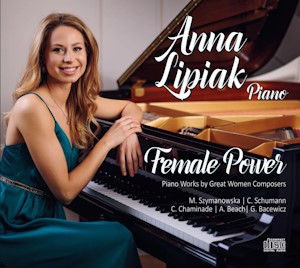
Female Power
Anna Lipiak (piano)
rec. 2023
Private release [67]
I seem to be gathering collections of female composers just lately and considering the quality of much of the music therein this is no bad thing. Polish pianist Anna Lipiak now adds to the list with an interesting round up of mostly 19th and early 20th century romantic piano music with Grażyna Bacewicz’s Concert Krakowiak from 1949 the sole exception.
Cécile Chaminade is perhaps not a household name but there are several pieces that occasionally get an airing; not enough to account for her 171 opuses and assorted works without opus it must be said. Lipiak plays four relative rarities including two of her romances without words, the lilting slow waltz souvenance and the heart-warming meditation. Guitare used to be popular but has fallen out of fashion; it is nice to hear this little serenade with its mix of sadness and spirit. Fleetness of finger is needed for her short, quicksilver toccata and Lipiak certainly has that. American composer Amy Beach was a slightly younger contemporary of Chaminade and equally adept at writing wonderfully idiomatic piano music. The Scottish Legend is a glorious example of this, richly evocative with its rhythmic snap and modal harmonies. Beach’s penchant for chordal textures is also heard through not as overwhelmingly as in the earlier Ballade, an extended nocturnal barcarolle that grows quite impassioned as it progresses. Her sequence ends in playful mood with the jaunty little galop performed by the carnival clown Harlequin.
Maria Szymanowska was a Polish pianist and amongst the first professional touring pianists. She must have been quite the virtuoso though Mendelssohn wryly remarked that those who rated her most highly thought more of her pretty face than her not pretty playing. She moved to Russia for the final years of her life where she established a salon and became court pianist to Empress Alexandra Feodorovna. She has been described as the female Field and her nocturne in B flat has similarities to the Irish pianist’s nocturnes though its stormier, highly decorated sections look forward to Chopin. For all its classicism so too does the F minor polonaise which hints at the drama of Chopin’s C minor polonaise op.40. Clara Schumann’s light shines brighter now than any time since her death in 1896 and I am more aware of her music been programmed than ever before. The largest work on the disc is her G minor Sonata written when she was in her early twenties and newly married to Robert. Musically she was already shying away from the showy music that she had been brought up on, composers like Henri Herz and Friedrich Kalkbrenner and was introducing Beethoven Sonatas into her recitals and the serious nature of this piece shows this. A restrained allegro with hints of Beethoven’s dramatic contrasts and Schumann’s textural style is followed by a beautiful adagio that I wish was longer than its less than three minutes. The sprightly scherzo looks to Schubert and the bustling rondo finale echoes Beethoven and, especially in the more lyrical moments, Mendelssohn. Pride of place though for me is taken by the first of her op.21 romances in A minor. Once again Mendelssohn is an inspiration but that is not to take anything away from this memorably atmospheric work that would stand proudly alongside any of Brahms’ or Schumann’s miniatures. Ms Lipiak skips forward to the mid twentieth century for the concert krakowiak by Grażyna Bacewicz, a vigorous dance that is something of a high jinx dance of the tumblers. A darker hued section steps away from the action though its motifs lead directly into a return of the energetic high stepping dance.
If you want to know about Anna Lipiak a page of the gatefold sleeve lists the countries in which she has given recitals, her many awards including being a finalist in the 2013 Chopin Competition along with any other milestones and achievements. Of the composers and music there is no mention; whilst I am all for letting the music speak for itself I would consider that an album titled female power would want to say something on their behalf. Another tiny gripe is that while Lipiak is clearly a gifted player both technically and lyrically her Kawai piano is recorded in quite boxy sound with limited range. I yearned for more warmth and bolder, richer colours and though it is not unpleasant to listen to it is quite distinctive especially if you listen in sequence with another piano recording. Gripes over this is an engaging programme that clearly shows the quality of music that is out there to be discovered.
Rob Challinor
Availability: Artist’s website
Contents
Cécile Chaminade (1857-1944)
Souvenance No.1 from Romances sans paroles Op.76 (pub.1893)
Guitare Op.32 (pub.1885)
Meditation No.6 from Romances sans paroles Op.76 (pub.1893)
Toccata Op.39 (1887)
Amy Beach (1867-1944)
Scottish Legend No.1 from 2 piano pieces Op.54 (1903)
Ballade Op.6 (1894)
Harlequin No.6 from Children’s Carnival Op.25 (1894)
Maria Szymanowska (1789-1831)
Nocturne in B flat minor
Polonaise in F minor from Dix Huit danses de différent genre (1819)
Clara Schumann (1819-1896)
Romance Op.21 No.1 (1853)
Sonata in G minor (1841-42)
Grażyna Bacewicz (1909-1969)
Concert Krakowiak (1949)


















